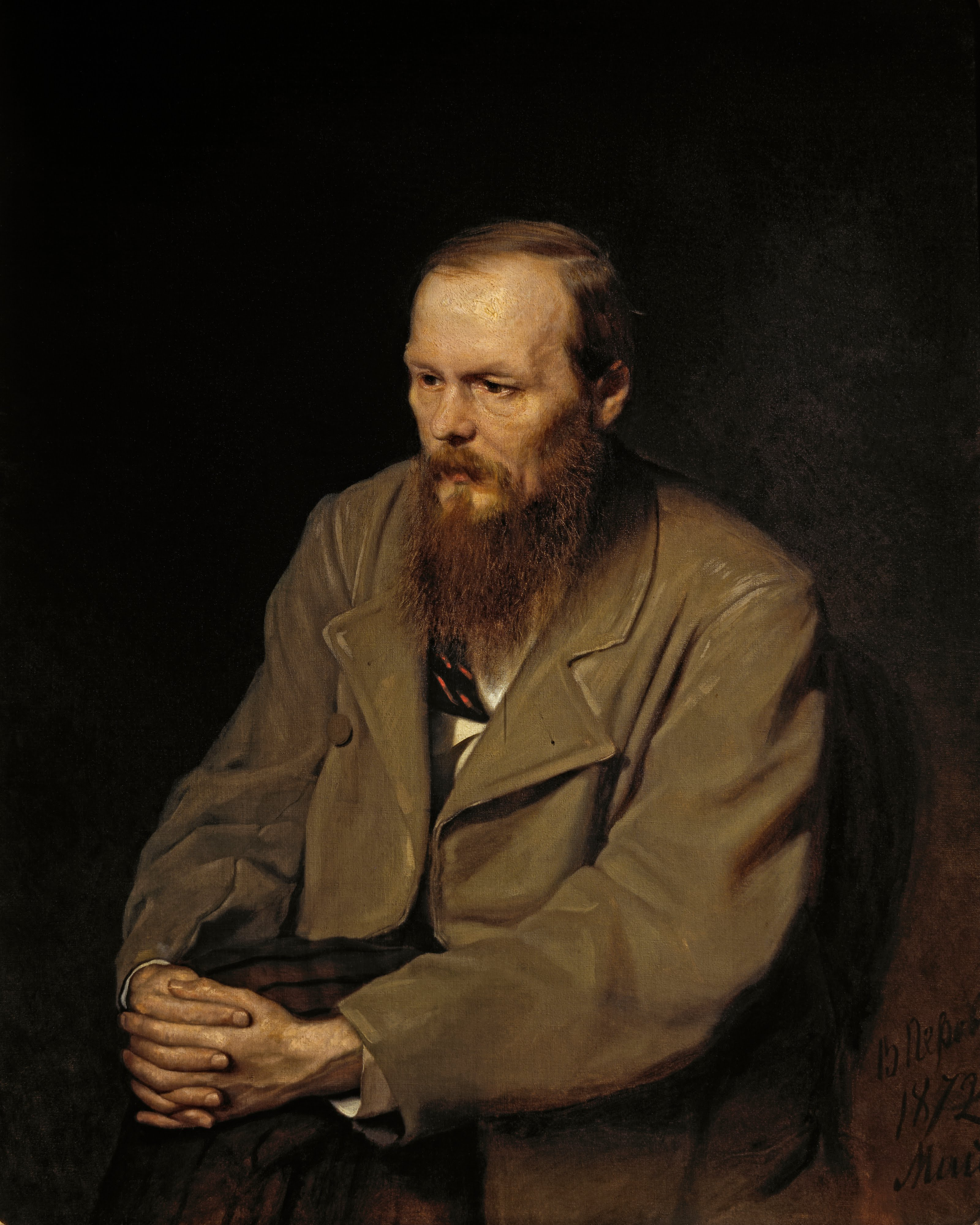“[…] il faut d'abord apprendre à vivre soi-même avant de faire la leçon aux autres!”
Les Carnets du sous-sol (Записки из подполья), 1864, Partie II : Sur la neige mouillée
Fiodor Mikhaïlovitch Dostoïevski est un écrivain russe, né à Moscou le 30 octobre 1821 et mort à Saint-Pétersbourg le 28 janvier 1881 . Considéré comme l'un des plus grands romanciers russes, il a influencé de nombreux écrivains et philosophes.
Après une enfance difficile, il fréquente une école d'officiers et se lie avec les mouvements progressistes pétersbourgeois. Arrêté en avril 1849, il est condamné à mort. Après un simulacre d'exécution, il est finalement déporté dans un bagne de Sibérie pendant quatre ans. Redevenu sous-lieutenant, il démissionne de l'armée en 1859 et s'engage complètement dans l'écriture. Épileptique, joueur couvert de dettes et d'un caractère sombre, Dostoïevski fuit ses créanciers et mène une vie d'errance en Europe au cours de laquelle il abandonne toute foi dans le socialisme et devient un patriote convaincu de l'Empire russe.
Écrivain admiré après la publication de Crime et Châtiment et de L'Idiot , l'auteur publie ensuite ses deux œuvres les plus abouties : Les Démons et Les Frères Karamazov .
Les romans de Dostoïevski sont parfois qualifiés de « métaphysiques », tant la question angoissée du libre arbitre et de l'existence de Dieu est au cœur de sa réflexion, tout comme la figure du Christ. Ses œuvres ne sont pas des « romans à thèse », mais des romans où s'opposent de façon dialectique des points de vue différents avec des personnages qui se construisent eux-mêmes, au travers de leurs actes et de leurs interactions sociales. Dostoïevski chemine ainsi principalement sur différents thèmes de la nature humaine et de la condition humaine.
Wikipedia

“[…] il faut d'abord apprendre à vivre soi-même avant de faire la leçon aux autres!”
Les Carnets du sous-sol (Записки из подполья), 1864, Partie II : Sur la neige mouillée
Les Frères Karamazov (Братья Карамазовы), 1879-1880
), 1864, Partie I : Le Sous-sol
Les Carnets du sous-sol (Записки из подполья), 1864, Partie I : Le Sous-sol
Les Carnets du sous-sol (Записки из подполья), 1864, Partie I : Le Sous-sol
Les Carnets du sous-sol (Записки из подполья), 1864, Partie I : Le Sous-sol
Les Carnets du sous-sol (Записки из подполья), 1864, Partie II : Sur la neige mouillée
fr
“I am a sick man… I am a wicked man. An unattractive man.”
Я человек больной... Я злой человек. Непривлекательный я человек.
Part 1, Chapter 1 (page 7)
Notes from Underground (1864)
“To be in love is not the same as loving. You can be in love with a woman and still hate her.”
The Brothers Karamazov (1879–1880)
Source: The Dream of a Ridiculous Man (1877), III
The Brothers Karamazov (1879–1880)
The Brothers Karamazov (1879–1880)
Part 2, Chapter 2 (page 56)
Notes from Underground (1864)
Book II, ch. 4 (trans. Constance Garnett)
The Elder Zossima, speaking to Mrs. Khoklakov
The Brothers Karamazov (1879–1880)
Book II, ch. 4 (trans. Constance Garnett)
The Brothers Karamazov (1879–1880)
“The formula 'two plus two equals five' is not without its attractions.”
Part 1, Chapter 9 (page 31)
Notes from Underground (1864)
“My feelings, gratitude, for instance, are denied me simply because of my social position.”
The Devil (Ivan's Nightmare)
The Brothers Karamazov (1879–1880)
“Man is unhappy because he doesn't know he's happy. It's only that.”
Part II, Ch. I
The Possessed (1872)
Variant translations:
Above all, do not lie to yourself. A man who lies to himself and listens to his own lie comes to a point where he does not discern any truth either in himself or anywhere around him, and thus falls into disrespect towards himself and others. Not respecting anyone, he ceases to love, and having no love, he gives himself up to passions and coarse pleasures, in order to occupy and amuse himself, and in his vices reaches complete bestiality, and it all comes from lying continually to others and to himself. A man who lies to himself is often the first to take offense. It sometimes feels very good to take offense, doesn't it? And surely he knows that no one has offended him, and that he himself has invented the offense and told lies just for the beauty of it, that he has exaggerated for the sake of effect, that he has picked on a word and made a mountain out of a pea — he knows all of that, and still he is the first to take offense, he likes feeling offended, it gives him great pleasure, and thus he reaches the point of real hostility… Do get up from your knees and sit down, I beg you, these posturings are false, too.
Part I, Book I: A Nice Little Family, Ch. 2 : The Old Buffoon; as translated by Richard Pevear and Larissa Volokhonsky, p. 44
The Brothers Karamazov (1879–1880)
Book II, ch. 3 (trans. Constance Garnett)
The Elder Zossima, speaking to a devout widow afraid of death
The Brothers Karamazov (1879–1880)
“Taking a new step, uttering a new word, is what people fear most.”
Crime and Punishment (1866)
The Brothers Karamazov (1879–1880)
As quoted in Kierkegaard, the Melancholy Dane (1950) by Harold Victor Martin.
Variant translation:
I believe in Christ and confess him not like some child; my hosanna has passed through an enormous furnace of doubt.
Last Notebook (1880–1881), Literaturnoe nasledstvo, 83: 696; as quoted in Kenneth Lantz, The Dostoevsky Encyclopedia (2004), p. 21, hdn ISBN 0-313-30384-3
Part 1, Chapter 1 (page 8)
Notes from Underground (1864)
“A fool with a heart and no sense is just as unhappy as a fool with sense and no heart.”
The Idiot (1868–9)
“Why count the days, when even one days is enough for a man to know all happiness?”
The Brothers Karamazov (1879–1880)
Source: The Dream of a Ridiculous Man (1877), III
“It is better to be unhappy and know the worst, than to be happy in a fool's paradise.”
The Idiot (1868–9)